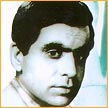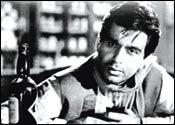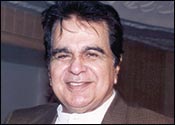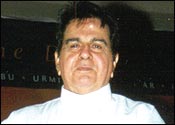
|
'Devdas and I still don't see eye to eye'
Thespian Dilip Kumar relives his role as Indian cinema's most tragic hero
|
Sarat Chandra Chatterjee's classic finds itself cinematically interpreted for the third time. Only this time, it comes neatly packaged with yuppie stars, designer costumes and an England-returned, rather well fed Devdas.
The first production, in 1935, with the inimitable K L Saigal, was made when cinema was in its infancy. But it remains a classic that hardened K L Saigal fans swear by even today. The magical score and lyrics of unforgettable tunes like Dukh ke ab din beetat naahin and Balam aye baso more man mein,
penned by the 19-year-old Kidar Sharma, still retain their quality of eternal freshness.
In P C Barua's Devdas, K L Saigal immortalised himself as the doomed lover and influenced every love tragedy thereafter. He even put in a cameo appearance in the Bengali version of Devdas made again by Barua.
The second effort with the unsurpassed
Dilip Kumar as Devdas, is the one that most people remember with. The mention of Devdas conjures up only one image -- Dilip Kumar. The film also brought Vyjayantimala (as Chandramukhi) into the limelight, asserting her position as an actress rather than a dancer. And Paro reinforced Suchitra Sen's quiet mystique.
On the eve of the release of Sanjay Leela Bhansali's magnum opus,
Lata Khubchandani persuades Dilip Kumar to rewind to his 1955 film:
May we go back to the time you played Devdas?
It is over 40 years that I acted in Devdas. It is a closed chapter for me.
Have you seen the new production? What did you think of it?
No, I have not seen Sanjay Leela Bhasali's version. And I do not believe in comparisons. It may be relevant for the observer, not for me.
We worked hard at the time; we did our best. I am sure the present set of talented people have done their best. Perhaps there are differences in style. But I do not think there is a need to discuss that; needless comparisons are unhealthy.
How true was your portrayal to the hero of Sarat Chandra Chatterjee's novel?
As true as it could have been. It could have been a novel by Sarat Chandra Chatterjee, Munshi Premchand, Sadat Hasan Manto or Bankim Chandra Chatterjee. These were pieces of literature pieced together based on a lot of things we had imbibed, subjects that were available and indentifiable to us.
 Did you think that P C Barua's version with Saigalsaab stayed true to the book?
Did you think that P C Barua's version with Saigalsaab stayed true to the book?
The earlier version was very simple, saada saada sa tha. Cinema had not developed a culture of its own then. Literary works sometimes strayed over the top, but that was not true with Devdas. I saw the film later. Frankly, when you remake something, it is better not to see too much of the original. At least then there is some contrast.
However, a remake should never be made with the intention to better earlier versions; with that notion of superiority. Though I am sure young Shah Rukh and the very talented Sanjay have made something very absorbing.
How much scope does an actor have in a work like Devdas?
He cannot go beyond the ambit of the story. For me, it was all in a day's job. The fact still remains that it is a very moving piece of work, but there were other poignant films too. I had read the novel earlier and it moved me.
On a personal level, what affect did Devdas have on you? We had heard that you had put so much into the role, it affected your health...
 It was not just Devdas, it was a series of films I did. For someone my age, so many tragic films were just not right. If you remember, most of the tragedians in the West were all middle-aged or older.
It was not just Devdas, it was a series of films I did. For someone my age, so many tragic films were just not right. If you remember, most of the tragedians in the West were all middle-aged or older.
It is difficult to cope when you are a youngster and brimming with interest. You have to give a lot of your spirit and emotion, you begin to introspect and it gets you down in the long run.
How many times can you do a death scene? And how do you do it differently each time? You cannot die the same way every film! There must be a difference, and that must arise from the construction of the scene. It is not a question only of the screenplay.
I discussed the paradox of how an actor ought to become the character he portrays with with some of my psychiatrist friends in England. Or how much of himself he must lend to the character and how he ought to recover from it and break free.
You see, at the time, the only thing that was open to make me feel like Devdas was getting myself drunk silly. And I was never much of a drinker!
 How difficult was it to essay the role, then?
How difficult was it to essay the role, then?
To be candid, I was not comfortable with the initial scenes. I still cannot bring myself to agree with Devdas, when hits Paro with a stick and says, 'I have given you this mark to punish your pride'.
But I played the part. And because the author was good, he turned the most nonsensical idea into sense.